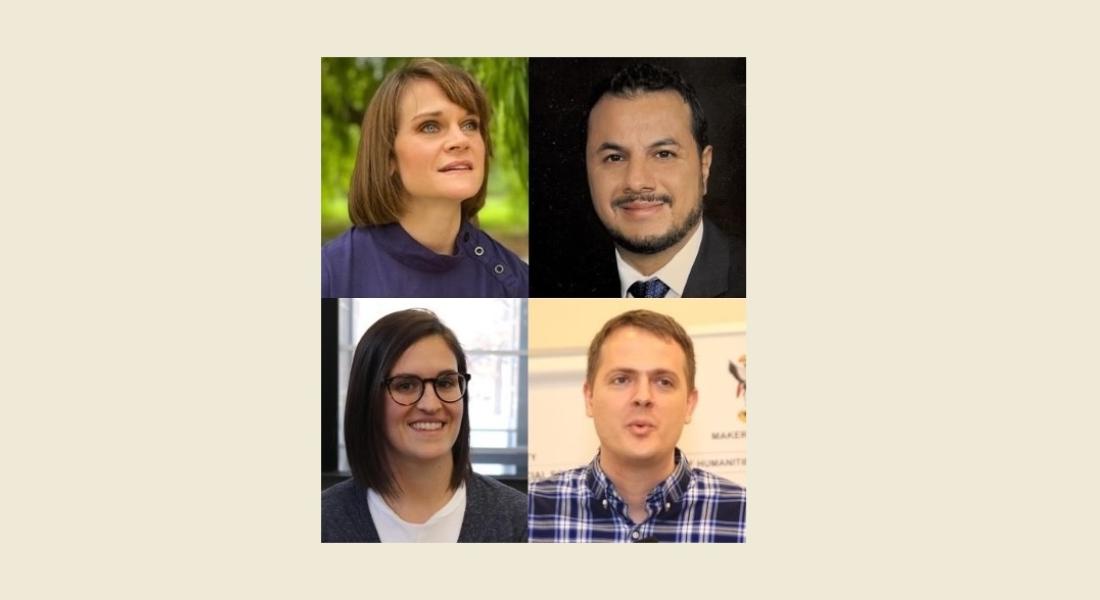
Four scholars have arrived at the Kellogg Institute for International Studies as part of its spring cohort of visiting fellows. Their expertise lies in ethnography, law, history, and political science, spanning geographic areas from Mexico, Venezuela, and Central America to Uganda,
Combined with those who are continuing fellowships from the fall, a total of nine visiting fellows are working on projects at the Kellogg Institute for the spring 2025 semester.
The new fellows are:
Rebecca Hanson
University of Florida
Hanson is assistant professor in the Department of Sociology and Criminology & Law and the Center for Latin American Studies at the University of Florida, where she is also director of the International Ethnography Lab. Her research focuses on policing, armed violence, and illicit markets in the Global South. At Kellogg, she is continuing her study of contemporary authoritarian states in the Global South. Drawing on ethnographic, interview, and survey data collected over ten years in Venezuela, she is analyzing how relationships between multiple armed groups and the state have evolved over time.
Fernando Ojesto
Universidad Nacional Autónoma de México (UNAM)
Ojesto is the Fulbright-García Robles COMEXUS Mexico Studies Chair at the Kellogg Institute for International Studies for the spring semester. He is a professor of the philosophy of law, electoral law, and comparative law at UNAM Law School in Mexico City. During his Kellogg visiting fellowship, he is working on the project “How to (Un)Build a Democracy: The Mexican Case,” which explores the electoral justice systems in the region, as well as the risks that democracy has been undergoing worldwide in recent years.
Rachel Schwartz
University of Oklahoma
Schwartz is assistant professor of international and area studies at the University of Oklahoma. Her research examines the legacies of armed conflict, corruption, statebuilding, and peacebuilding, with a regional focus on Central America. Schwartz is working on a new book project, “International Anti-Corruption Commissions, Elite Manipulation, and Democratic Backsliding in Central America.” She is analyzing the development and trajectories of international anti-corruption commissions in Central America and examining why these institutional innovations have given way to democratic backsliding.
Edgar Taylor
Makerere University
Taylor is a lecturer in the Department of History, Archaeology and Heritage Studies at Makerere University. His research examines urban protest, racial politics and institutional life in twentieth-century Uganda. At Kellogg, Taylor is working on his book project “Infrastructures of Exclusion: Authority and Everyday Politics in Urban Uganda, 1959-1972,” about racial populism and urban governance in the years preceding the Ugandan Asian expulsion of 1972.
They join five continuing Kellogg Institute visiting fellows for the spring:
- Nermin Allam, Rutgers University-Newark
- Sandra Botero, Universidad del Rosario
- Juan Sebastián Chamorro, Hewlett Visiting Fellow for Public Policy
- Marianne Kneuer, Dresden University of Technology
- Kelly McMann, Case Western Reserve University
Since 1983, the Kellogg Institute for International Studies has offered visiting fellowships to promote interdisciplinary international research on democracy and human development in a supportive community of scholars. This widely respected residential program offers fellows time and resources to pursue scholarly inquiry, advance personal research, and collaborate with other scholars and practitioners from across the US and around the globe.
Click here to see all scholars who have been Kellogg visiting fellows throughout the years.





